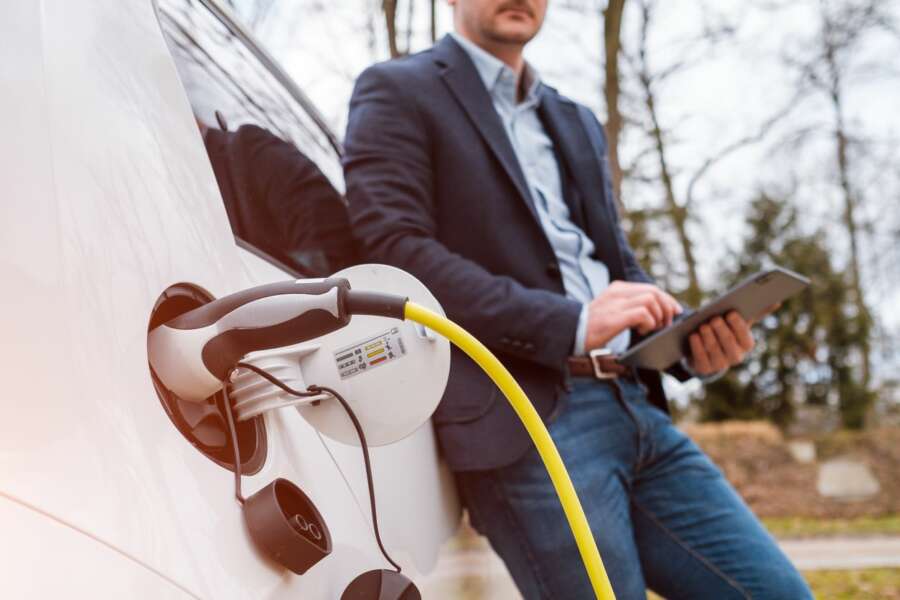
To be bylined to Ben Thompson, Managing Director, EV and Energy at Radius
The electric impact
With ambitious net zero targets edging ever closer, more and more businesses are looking into how they can make a real impact. In their endeavour to reduce their carbon footprints, businesses are starting to realise the potential of electric vehicles (EVs). But it would be wrong to assume that the benefits of embracing this cutting-edge technology only extend to the environment.
Future proofing fleets
Every business’ EV needs are different. Some will see value for years to come by electrifying their fleets, while others will invest in on-site charge points to provide accessible charging solutions for company and staff vehicles. Some will start small, while others will implement their EV transition at pace.
Regardless of the speed or scale of their rollout, businesses that embrace EVs are taking future-proofing seriously. And the benefits of switching from internal combustion engine (ICE) vehicles will be keenly felt throughout operations.
Spotlight on success
Aston Barclay, the vehicle auction and remarketing supplier, has already achieved Electric Vehicle Approved (EVA) accreditation for its Donington Park centre in Derby. But this is only the beginning, as Aston Barclay has its sights set on attaining this sought-after accreditation across its six UK sites in 2024.
Radius, the global fleet and connectivity leader headquartered in Crewe, has been appointed by Aston Barclay to enhance its EV charging infrastructure. Speaking of the new partnership, Albert Parnell, group EV lead at Aston Barclay said: “As an organisation, we understand the need to adapt to a more EV-focused landscape, and we have invested heavily in marketing and training around electric vehicles for our colleagues, customers and partners, so the Radius partnership, which will improve the infrastructure across all of our sites, feels like the natural next step.”
In comparison to its sector, Aston Barclay is certainly ahead of the game when it comes to embracing EVs. With its refreshingly progressive and ambitious outlook, Radius is immensely pleased to be partnering with Aston Barclay, and the company will oversee the design and implementation of EV charging solutions that suit the business not only now, but well into the future.
The rollout will begin in early 2024 at Aston Barclay’s Wakefield centre, and further works to transform the remaining sites will take place throughout the year. Radius will deploy modern charge points that incorporate the latest technologies, while also ensuring they are compliant with PAS:1899. This standard makes sure charge points are accessible to all, consider the local environment and are aligned with placement, information provision and design standards.
Beyond sustainability
Embracing EV charging solutions, of course, makes a hugely positive impact on the environment. But doing so can also have a huge impact on a business’ finances and staff satisfaction levels.
Minimising operational costs
Providing on-site charging is becoming an attractive option for many businesses looking to streamline the costs of doing business. By installing charging sites at the office, for example, fleet drivers can fully charge without having to worry about charging on the road unless it’s absolutely necessary. Doing so means businesses can dodge the premiums added to public charge points. Having a charging base at the office can also help to minimise range anxiety, as fleet managers will know that all vehicles are fully charged before employees set off on their travels.
Tackling range anxiety
Some businesses are also implementing charge points at employees’ homes, which helps to tackle range anxiety by giving both business and employee peace of mind that they will always be able to charge their EV. Such charging solutions also encourage employees to drive EVs to work, helping to reduce the environmental impact of their commutes too.
Boosting employee satisfaction
We are also witnessing the growth of salary sacrifice schemes too, where businesses are helping employees to hire their own electric vehicles. Doing so can help employees interested in EVs financially, as the initial outlay for these vehicles can be expensive, which can hugely boost staff satisfaction and provide an exciting incentive when recruiting new staff.
A movement gaining momentum
The EV transition will only continue to gain momentum over years to come, and last year Radius announced a £10 million investment into its EV division to bolster its headcount and finance innovative charging hardware solutions.
Radius offers technology-led solutions to businesses in 19 countries across five continents. Founded in 1990 in Crewe, the company is still headquartered in the town today.


